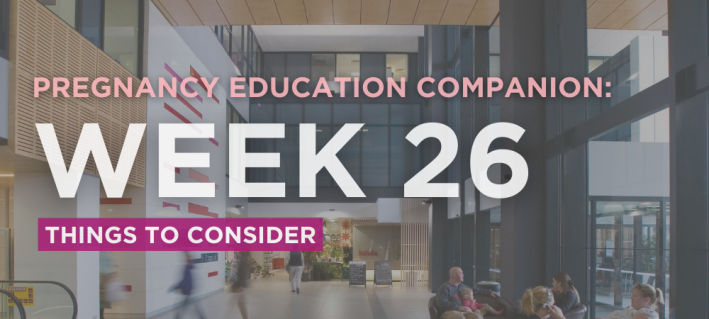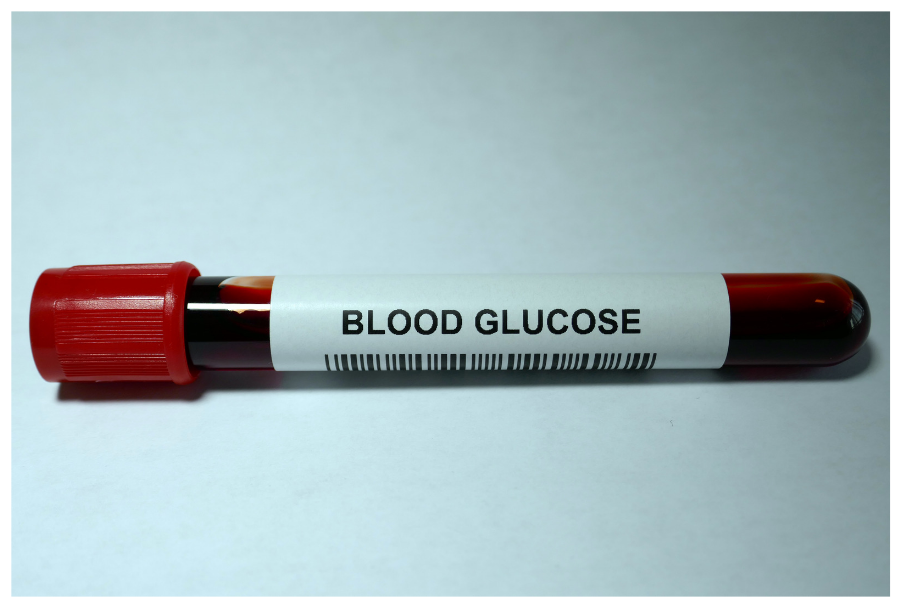
If you don't want to receive this information, please call (03) 8345 3272 or email patientexperience@thewomens.org.au
This week, we remind you about the Glucose Tolerance Test for gestational diabetes. We’ll also discuss informed decision-making, breastfeeding education and support, what to expect when you go to the hospital, and pregnancy loss.
Part 1: Things that are relevant to your pregnancy now

As discussed in week 22, some people may develop gestational diabetes mellitus (GDM), a type of diabetes that can happen between weeks 24 and 28 of pregnancy. It usually goes away after the baby is born.
It’s recommended that you be tested for gestational diabetes at around 26 to 28 weeks unless you already have diabetes.
An oral Glucose Tolerance Test is used to check for elevated blood sugars.
For this test you’ll need to:
- bring your pathology slip to the hospital; you got this at your last appointment
- fast from midnight the night before your test, until your test is completed the next day. This means no eating, chewing gum, or smoking. You can only drink water during this time.
The testing process involves several steps:
- you’ll have your first blood test
- you’ll drink a glucose drink from our pathology department
- you’ll continue to fast and have 2 more blood tests - one an hour after having the drink and another an hour later.
This test takes about 2 hours. Please stay in the hospital until it’s finished.

For more information about gestational diabetes visit our website or Diabetes Australia.
Part 2: Things to consider

The best healthcare decisions happen when you and your healthcare team make them together. Your healthcare team should explain things clearly, discuss your options with you, and listen to your concerns. This is shared decision making.
In shared decision making, you take an active role in choosing your healthcare. This helps make sure the decisions reflect what matters most to you.
You and your healthcare team will work together to develop your treatment and care plan. You’ll discuss different treatment options, their risks and benefits, and consider your preferences and values. This helps you agree on a plan that leads to the best results for you and your baby.
Asking questions is important when it comes to shared decision making because it helps you understand your situation and the options available to you.
Questions to consider:
- What options do I have?
- What are the benefits?
- What are the risks?
- Can you provide written information for me to read at home?
To learn more about shared decision making, visit Australian Commission on Safety and Quality in Health Care website.


The Women’s is a Baby Friendly Health Initiative accredited hospital and follows the World Health Organization’s 10 steps for successful breastfeeding.
We know that breast milk provides all the nutrition your baby needs for the first 6 months of life and continues to be a significant source of nutrition in their first year and beyond.
On our website, you’ll find lots of information about breastfeeding, including:
- the importance of breastfeeding
- tips for successful breastfeeding
- good feeding practices
- how to breastfeed effectively.
If you choose not to breastfeed or offer breast milk, or if you’re unable to, we’ll give you information and support about formula feeding options.

Lactation consultants are available to help you, whether you’re in hospital or after you leave. Our Breastfeeding Service provides evidence-based advice and support to families who have given birth at the Women’s. They can also help you if your baby is in our Newborn Intensive Care Unit (NICU).
Other support services
- Breastfeeding Helpline - Australian Breastfeeding Association
1800 686 268
You can call any time, day or night. - Maternal Child Health Helpline
13 22 29
You can call any time, day or night - To find a lactation consultant, visit the Lactation Consultants of Australia & New Zealand website.

During pregnancy, your body goes through many changes to prepare for your baby. Most of these changes are normal, but it's important to watch for any signs of potential problems and know when to get medical help.
Please note: If you’re worried about yourself or your baby, have any bleeding, feel very unwell, or think you may be in labour, go to the Women’s Emergency Care Department as soon as your symptoms start.
Here are some unexpected issues that may occur during pregnancy:
- bleeding from your vagina
- placental abruption – when the placenta partly or completely comes away from the uterus
- miscarriage
- high blood pressure
- pre-eclampsia - high maternal blood pressure and protein in the urine
- low lying placenta
- breech lying position – the baby’s bottom or feet, instead of its head, are facing towards the opening of the uterus
- premature labour and birth
- gestational diabetes
- induction of labour – when we need to use medical treatments to start labour
- caesarean section birth.
The Health Information section on our website covers many of these topics. For more detailed information, please speak with your doctor or midwife.

Pregnancy loss can happen at any time, from early in pregnancy to soon after birth. Despite advances in medicine and technology, a small number of pregnancies end early, often without a clear cause.
Each loss is unique, and grieving parents will respond in their own ways.
Our staff supports families by ensuring privacy, allowing time with their baby, taking photos, helping with bathing, and answering questions. We aim to meet the needs of parents and families during this difficult time.
We offer specialised bereavement services, including:
- crisis counselling
- information on what to do next, such as arranging a funeral, burial, or medical examination (post-mortem) to find the cause of death
- practical help and referrals to community support.
We encourage parents to take their time in making decisions after the loss of a baby. Families are offered a follow-up visit with a senior doctor at the hospital to discuss their care and possible reasons for the pregnancy loss.
We hope you have found this information helpful.
Remember you can go back to previous weeks.
If you have any health concerns, please talk to one of your health care professionals – midwife, General Practitioner (GP), hospital doctor, etc.
There will be more to read and learn next week, in week 27. Stay safe and well.